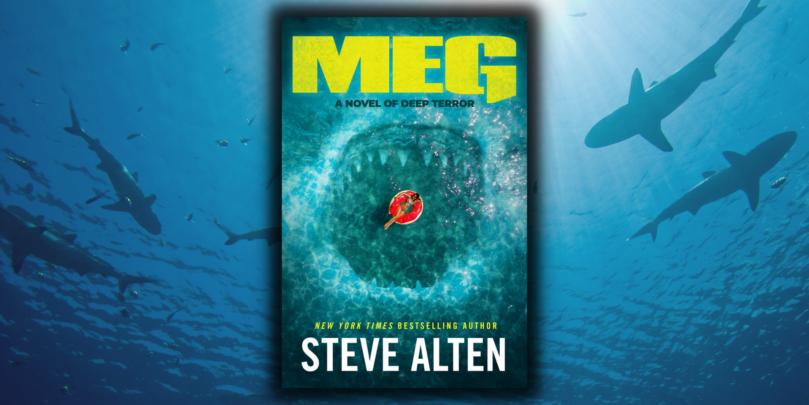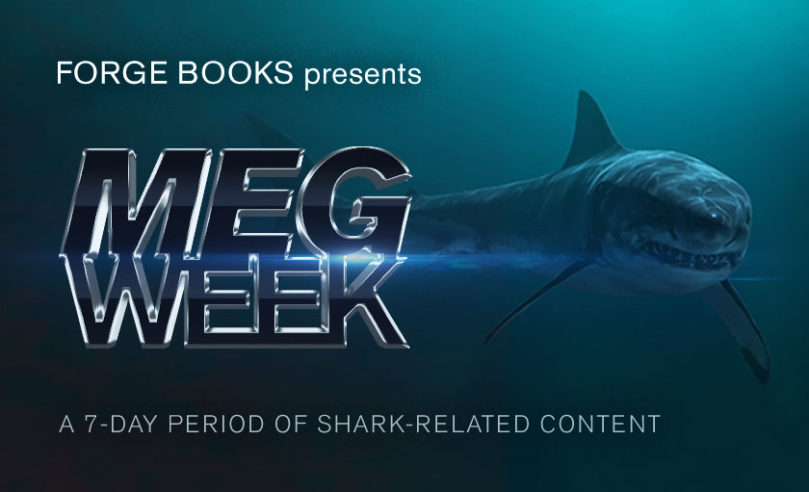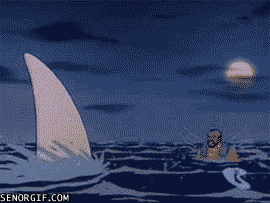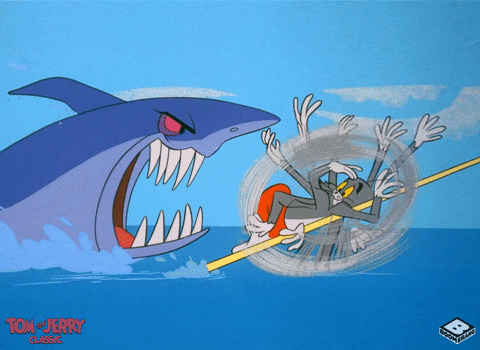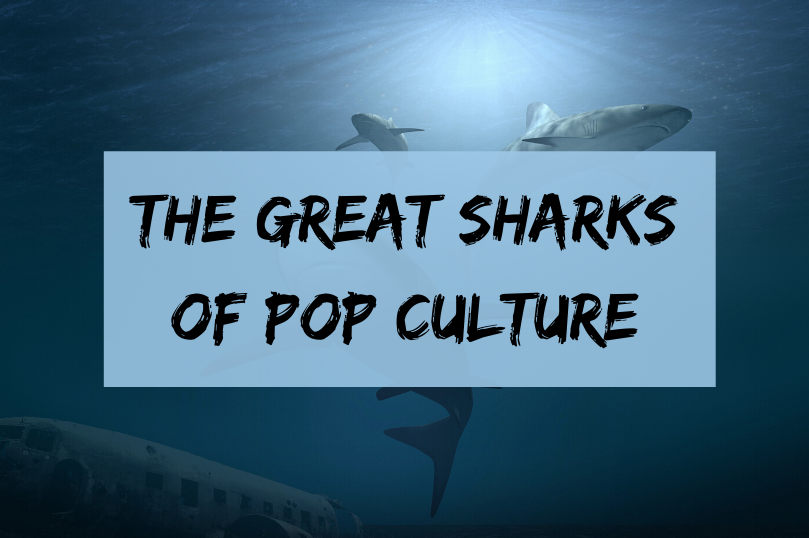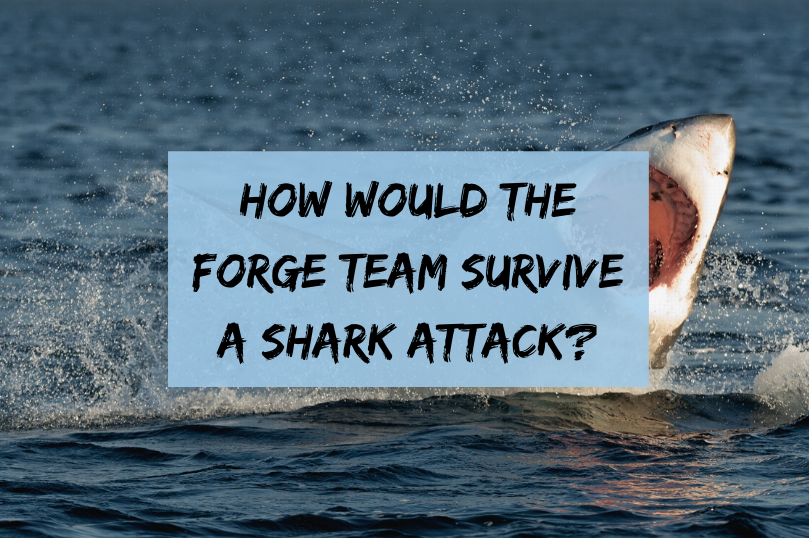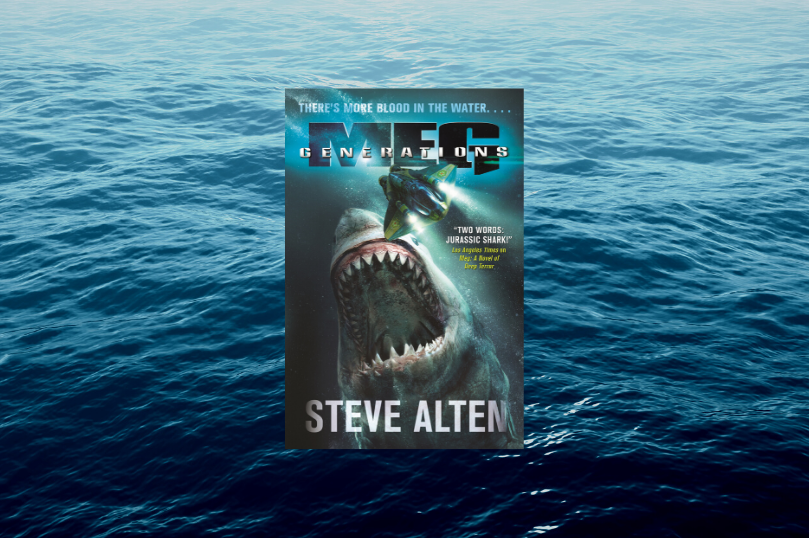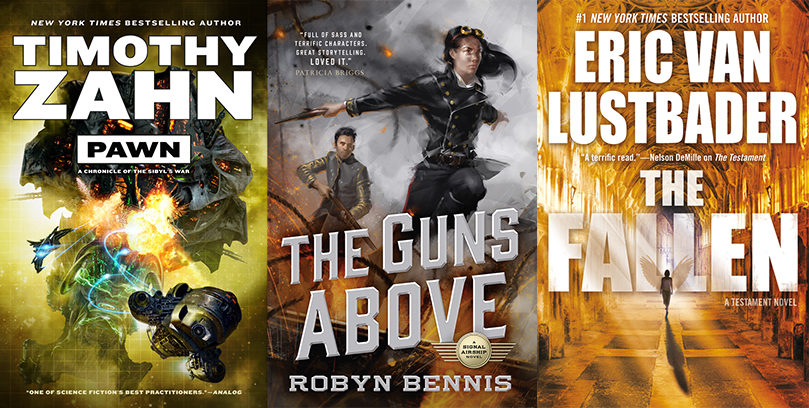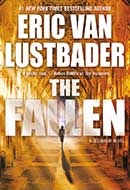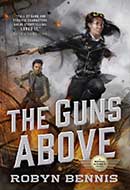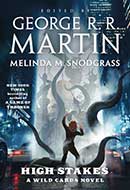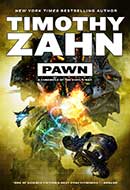opens in a new window opens in a new window
opens in a new window opens in a new window
opens in a new window opens in a new window
opens in a new window opens in a new window
opens in a new window
opens in a new window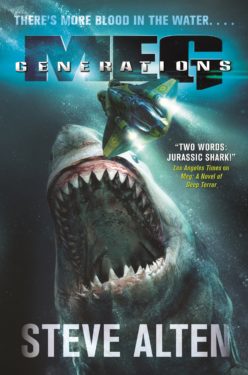
In opens in a new windowMEG: Generations, Steve Alten New York Times bestselling author continues his terrifying series.
DUBAI: An impossibility is being taken to the Middle East. The transport vessel Tonga is carrying a liopleurodon to the City of Gold. But while investors gawk at the prehistoric creature, any even more dangerous creature is beginning to stir.
The megalodon shark that Jonas Taylor worked so hard to capture is coming out of it’s drug-induced stupor and refuses to be contained. No both ancient creatures, older than mankind itself, are loose in the waters of the Arabian Sea, and the region will never be the same.
opens in a new windowMEG: Generations will be available on July 21, 2020. Please enjoy the following excerpt.
Aboard the Tonga
Tanaka Oceanographic Institute
Monterey, California
The bull was lost.
For the entirety of its adult existence it had been the master of its domain―a domain defined by sound. A simple clickety-click and the silver-gray behemoth immediately recognized its territory, be it the subglacial lake in Antarctica where its kind had survived for eons, the shallows where its harem of cows had birthed their calves, or the now-accessible depths of the Southern Ocean where the dominant male had, up until recently, foraged for food.
None were present. Nor was there a memory of how the bull had come to be in this unrecognizable sea. And so it took refuge in the shallows in a semiconscious stupor, its blowhole remaining free of the water.
Jacqueline Buchwald adjusted the hood of her parka over her shoulder-length, strawberry-blond hair, the air temperature inside the bowels of the Malacca-class oil tanker kept at a brisk 42 degrees Fahrenheit. The Tonga and her sister ship, the Mogamigawa, no longer transported crude, their enormous holds having been scrubbed and refitted with seawater pens by their new owner―a Dubai crown prince―to stock Dubai-Land, his ambitious prehistoric aquarium theme park in the United Arab Emirates. The size of the tank was a necessity―the species targeted for capture were among the largest and most dangerous life-forms ever to have existed on the planet.
The twenty-six-year-old marine biologist stood dead center of the catwalk, a narrow expanse of grated steel connecting the two walkways anchored along the port and starboard bulkheads. The hold was purposely kept dark in order to accommodate the eyes of the nocturnal species they had been hunting over the past year, the only light coming from strings of Christmas decorations wrapped around the walkway’s guardrails.
Jackie used the night-vision scope of her harpoon gun to search the dark waters forty feet below her perch for the lone animal that now occupied the Tonga’s hold. Jonas Taylor had dubbed the creature “Brutus,” and the name was apropos; at eighty feet and a hundred eighty-seven thousand pounds, the Livyatan melvillei was certainly a brute. Unlike the other prehistoric species, the Miocene whale had been discovered in an ancient habitat somewhere in Antarctica, its location safeguarded by Jonas’s colleague, Zachary Wallace, the marine biologist who, years earlier, had resolved the mystery of the monster that inhabited Loch Ness.
Capturing the Miocene whale had been an accident. Jonas’s son, David, had set the Tonga’s nets at the exit point of an Antarctic bay to capture the adult Liopleurodon they had been chasing for nearly a year when Brutus showed up, springing the trap.
Three weeks had passed since the whale’s capture. The feisty bull was not keen on being held inside the tight confines of the tanker, forcing Jackie to introduce phenobarbital into its pen to calm the beast. It was a tricky proposition; too little tranquilizer and the prehistoric mammal might go berserk, too much and it could drown.
Her employer, Fiesal bin Rashidi, had made it clear that he was in favor of the latter.
“Miss Buchwald, I did not spend tens of millions of dollars and eight long months at sea to capture a whale.”
“This isn’t just a whale, sir. Livyatan melvillei was a prehistoric sperm whale, only it possessed the lower jaw of an orca. Megalodon and melvillei were the two dominant predators during the Miocene era . . . maybe of all time. This creature’s teeth are actually bigger than a Meg’s teeth, and its bite is just as powerful. Your cousin just purchased the Tanaka Institute from the Taylors; the lagoon would be perfect for Brutus.”
“And what happens when it dies? All our specimens are female, capable of internal fertilization. You know firsthand that we’ve been storing eggs to ensure our exhibits’ longevity. This menace is a male. Without a female, the creature is a dead-end investment.
“The public also feels differently about penning a whale―even a prehistoric menace like this creature. Animal rights groups are staging protests outside the governor’s mansion in Sacramento. The crown prince has agreed to release the animal during this afternoon’s festivities aboard the Tonga. A special tracking device has been prepared. At precisely two o’clock, an hour before the prince makes his speech, I want you to tag the whale and prepare it to be released. Is that clear?”
“Two o’clock . . . yes, sir.”
Jackie peered through the harpoon gun’s night scope, which lifted the veil of darkness, rendering everything olive green. Bin Rashidi had given her an hour to tag the melvillei with the radio transmitter and then bring it out of its drug-induced state by adding fresh seawater to the tank so that it would be able to escape under its own power once they opened the tanker’s keel doors.
An hour’s not nearly enough time. Brutus has been drugged for three weeks; it could take several hours before he comes around. The last thing the crown prince wants is for the whale to go belly-up in front of the international news media.
She glanced at her cell phone to check the time before placing it in the ziplock bag and tucking it in the back pocket of her jeans.
Twelve-fifteen. Tag it and then wait another fifteen minutes before you add fresh water.
She located the semiconscious bull in the shallows where the keel angled to conform to the Tonga’s bow. Selecting a location between the whale’s blowhole and its dorsal hump, she
squeezed the trigger and fired. The harpoon buried the transmitter four feet inside the Miocene whale’s spermaceti organ, eliciting a stabbing pain accompanied by a burst of adrenaline that lifted the phenobarbital-induced fog.
Enraged, Brutus slapped its tail along the surface as it lurched ahead―beaching itself in
twenty feet of water.
The sensation of being trapped sent the beast into full panic mode. Whipping itself into a
barrel-roll, it attempted to dive, only to end up stuck on its side, its fluke unable to strike the hull in order to gain leverage, its ninety-three tons crushing its lungs and internal organs.
Jackie watched the Miocene whale through the night scope as it flailed helplessly on its left flank, seconds from flipping over onto its back. She reached for the walkie-talkie held snugly inside a holster clipped to her belt. “Bridge, this is Buchwald―pickup, goddammit!”
“This is Ensign Slatford.”
“Andrew, Brutus beached himself. Open the stern hatch; we need to raise the water level so he can swim free.”
“Jackie, I can’t add ballast without clearing it with the captain.”
“Then ask him; just do it fast!”
“Standby.”
Jackie removed the night scope from the harpoon gun and faced the stern. Thirty seconds passed before a stream of bubbles and foam rose to the surface, indicating the keel doors were open.
She returned her gaze through the night scope to Brutus. The water level was rising about a foot a minute, gradually lifting the beached behemoth, which was wriggling furiously while desperately slapping its fluke against the steel hull to prevent itself from going belly-up.
The rising tide finally floated the behemoth. It rolled onto its belly and wriggled away from the bow’s shallow incline until it slipped beneath the dark waters and disappeared.
“Buchwald to bridge―we’re good. Andrew, close the keel doors.”
“Roger that.”
Zzzzzzzzzzzzzzzzzt . . . zzzzzzzzzzzzzzzzzt
The double blast of echolocation sent Jackie’s skull reverberating as if it had been struck by a giant tuning fork. Looking down, she saw a ten-foot wake pass along the surface as Brutus accelerated toward the stern end of the hold two football fields away.
The water was rancid, permeated with the toxic scent and taste of phenobarbital, the acidic animal tranquilizer burning the delicate tissues of the whale’s blowhole. The fresh ocean water entering the tanker’s hold was a river of life.
The whale raced for it, homing in on its cooler temperatures.
Whomp!
The Miocene whale’s squared-off skull impacted and popped open a seam of rivets connecting two steel plates along the stern’s inner hull. Jackie registered the collision deep inside her bones. A moment later, she experienced a wave of nausea as the rusted grating beneath her feet began to shake and the darkness on her right squealed its final warning.
Dropping the harpoon gun, she grabbed for the safety rail and held on as the bolts connecting the bridge to the port bulkhead snapped and suddenly one side of the catwalk dropped, the grating sliding out from beneath her as it collapsed at a forty-five-degree angle.
“Oh God, oh God, oh God―”
The loose end of the bridge splashed down into the water, the starboard bulkhead holding tight.
Jackie pulled herself up, managing to straddle the rail. Realizing she had dropped the walkie-talkie, she looked down in time to see an undulating gray mass pass twenty feet beneath her unsteady perch―
Brutus heading back to the bow to make another assault on the stern.
The Bell 525 helicopter soared south above the Pacific coast on its short excursion from downtown San Francisco. Among its thirteen passengers was the CEO of the Emirates National Oil Company; one of the presidents of the National Bank of Fujairah; Ryan Skinner, the newly elected governor of California; a half-dozen chairmen representing three of the largest construction companies in Dubai; and a reporter with the Gulf News.
There were also two Arab security men, their Glocks bulging beneath the jackets of their dark suits.
The man seated alone in the last row unplugged his headphones, cutting off the voice of his first cousin. Crown Prince Walid Abu Naba’a had been pitching his entourage of financial backers about “his” aquarium and “his” juvenile Liopleurodon from the moment they had taken off from the rooftop of their hotel, and Fiesal bin Rashidi could not handle another Word.
Your Liopleurodon? Was it you who spent the last eight months aboard the Tonga, chasing that creature’s mother across the Pacific Ocean? Was it you who had to deal with a mutinous crew after you threatened to cancel their bonus checks?
The only reason we captured that monster’s offspring is because I held the mission together. . . me, cousin. Not you. Instead, you’ve reduced me to an afterthought. Do you think that I cannot hear the whispers of deceit coming from back home . . . your discussions to buy out my twenty percent? To replace me as director of Dubai-Land?
Without me, there would be no aquarium . . . there would be no Dubai-Land!
Fiesal bin Rashidi massaged the tension knotting beneath his unibrow. The Dubai-Land Resort and Aquarium was on the verge of becoming the entertainment mecca of the world. Yet by the time the park opened, he would be as forgotten as Billy Wilkerson, the man who had lost the Flamingo Hotel in Las Vegas to Bugsy Siegel.
Like his father before him, Fiesal bin Rashidi was an engineer, earning his degrees from Cambridge, his field of interest targeting naval applications.He had been working on the Chunnel when a friend introduced him to a marine biologist in need of someone with his Expertise.
Dr. Michael Maren had been as paranoid as he was brilliant―an odd chap who had avoided eye contact when he spoke and trusted no one. His mother had died recently, leaving him an abundance of wealth with which to pursue his scientific endeavors. Maren had been interested in exploring the deepest ocean trenches in the world and was looking to hire a naval engineer who could design a deep-water habitat possessing a submersible docking station capable of withstanding water pressures in excess of nineteen thousand pounds per square inch.
The challenge had been enormous, the requirement a bit baffling, since the Mariana Trench, the deepest known location on the planet, possessed sixteen thousand pounds of pressure. Still, the job paid well and Fiesal could work on it while he completed his work on the Chunnel.
Over the next three years the naval engineer had tested half a dozen different designs before coming up with one that had proved stable enough to flood and drain a docking station nine miles beneath the surface. Two titanium habitats had been built while Maren’s research vessel was fitted with an A-frame, winch, and steel cable strong enough to lower and raise the enormous weight. After five years of construction and tests, the marine biologist ad been ready to set sail to “an unexplored realm.” Fiesal had been offered a position on the maiden voyage, but the thought of spending upward of a year at sea with the volatile scientist and his lover/assistant, Allison Petrucci, held no appeal. With the Chunnel complete, Fiesal had accepted an offer from his father’s firm, returning to Dubai to work on the emirate’s new airport.
Eighteen months later, he had been contacted by Allison Petrucci, who informed him Dr.
Maren was dead. After coercing the engineer into signing a nondisclosure agreement, the woman had presented him with evidence of an unexplored sea that dated back hundreds of millions of years, possessing ancient marine life that could be captured and placed on exhibit. For a seven-figure sum she would provide Fiesal with the coordinates of an access point into the realm her fiancé had referred to as the Panthalassa Sea.
Bin Rashidi had needed more convincing. He got it when the woman had produced a map of the Philippine Sea Plate, indicating that the ancient sea actually resided beneath the Mariana Trench. Years earlier, Jonas Taylor had theorized that these same depths harbored a warm-layer habitat that supported a subspecies of Megalodon, a sixty-foot prehistoric cousin of the great white shark. He had proven it to the world when one of the monstrous sharks―a pregnant female―had risen to the surface. Taylor had been forced to kill the beast, but its surviving pup, Angel, had grown into a seventy-four-foot monster, and for years was the star attraction of the Tanaka Oceanographic Institute.
If Fiesal could bring such an attraction to Dubai . . .
The Middle East was a battleground. America’s military interventions in Iraq and a failed Arab Spring had only added more fuel to that fire. Democracy had been subverted in Egypt, autocratic rule festered in Syria and Iran, and ISIS militants were threatening both Arab states and the West.
Three months after his meeting with Allison Petrucci, Fiesal bin Rashidi had presented his first cousin, Crown Prince Walid Abu Naba’a, with a business plan for Dubai-Land, a marine theme park featuring a dozen five-star hotels centered around massive aquariums stocked with real prehistoric sea monsters. The popularity of the Tanaka Institute had proven the public’s love of aquatic beasts; Dubai-Land would take the concept multiple steps further, making their country the number one tourist destination in the world. Just as important, the aquarium would present Westerners with a more positive opinion of Muslims, while inoculating the UAE against the threat of radical Islam.
Bin Rashidi had designed the supersized aquariums himself. He had also identified two Malacca-class crude oil tankers, the Tonga and the Mogamigawa, that could be purchased from the Japanese. All that was needed was the crown prince’s capital and someone to lead the underwater safari to stock their exhibits.
Jonas Taylor was the unanimous choice—only the former Navy submersible pilot and marine biologist had flatly refused. He and Dr. Maren had crossed paths before, the last time culminating in Michael’s death. The Tanaka Institute did agree to sell two of Angel’s four surviving Megalodon offspring to the crown prince, along with four of its deep-sea Manta Submersibles.
But there was another Taylor who had captured Fiesal’s eye―Jonas’s son, David. The cocky twenty-one-year-old was not only a highly skilled Manta pilot, but he seemed fearless around the Megalodons. A lucrative summer job offer in Dubai to stabilize the two Meg runts in their new aquariums was the lure to bring David to the UAE; but it was a summer romance with one of their pilot candidates―Kaylie Szeifert―that would send him into the depths of the Panthalassa Sea searching for ancient prehistoric monsters.
Locating the Panthalassa life-forms had been easy; drawing them into the surface ships’ nets had proved to be a bit more challenging. After several months, the submersible crews had managed to capture four different species, two of which perished inside their tanker Pens.
And then Fiesal bin Rashidi had laid eyes on the Liopleurodon.
The creature was an aberration of evolution—a specimen that Fiesal knew would easily become the identity of the aquarium. While the rest of the crew aboard the Tonga remained mesmerized by the Lio, Fiesal had fired a tracking device into the animal’s back as it surfaced, ensuring they would not lose their prized quarry.
For the next eight months, the aquarium director and his crew aboard the Tonga had chased after the hundred-twenty-two-foot creature as it trekked across the Western Pacific and south to Antarctica. The Lio had refused to surface, and Fiesal’s team of submersible pilots had been too afraid to venture close enough to engage the goliath and lure it into the tanker’s nets. Compounding the problem was the failure of bin Rashidi’s second unit aboard the Mogamigawa to capture a pod of Shonisaurus that had escaped the Panthalassa Sea. With only three of the twelve exhibits occupied, the crown prince’s initial excitement about the aquarium had waned, turning Fiesal’s optimism into doubt, his joy festering into resentment, frustration, and bitterness.
A sense of gloom seemed to hang over the Tonga. Desperate, lacking a game plan, and clearly out of his element, Fiesal bin Rashidi had lost the respect of his crew. The driving force behind the aquarium had spent his days alone in his stateroom, a prisoner to his own ambition. Women no longer interested him, gold no longer shimmered. Stuck on a seemingly endless voyage of damnation, Fiesal bin Rashidi, once the favored cousin of the crown prince, had become his albatross.
And then David Taylor had arrived on board the Mogamigawa and lady luck had returned. Three prehistoric sea creatures had been captured within thirty-six hours, including a Mosasaurus.
It was as if the sun had shone for the first time in almost a year.
The crown prince arranged for a helicopter to transport David, his friend Monty, and the ship’s female marine biologist, Jacqueline Buchwald, to the Tonga. A buzz of excitement had spread through the crew―David Taylor would take charge of the mission and capture the Lio. The Tonga would return home with its prize, families reunited, bonus checks cashed.
But was the son of Jonas Taylor to be trusted? The Liopleurodon had savagely taken the life of David’s girlfriend, and the young man was clearly haunted by her death.
Was he out to capture the Lio . . . or kill it?
In the end, the answer had turned out to be both.
Copyright © Steve Alten
Pre-Order Your Copy
opens in a new window opens in a new window
opens in a new window opens in a new window
opens in a new window opens in a new window
opens in a new window opens in a new window
opens in a new window
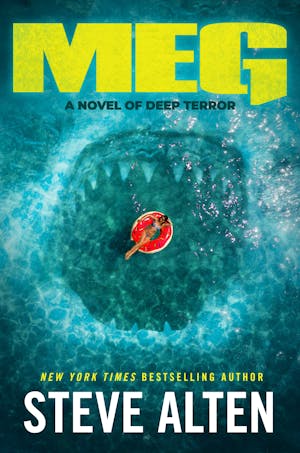 MEG: A Novel of Deep Terror is the book that launched New York Times bestselling author Steve Alten’s franchise and inspired an international blockbuster starring Jason Statham.
MEG: A Novel of Deep Terror is the book that launched New York Times bestselling author Steve Alten’s franchise and inspired an international blockbuster starring Jason Statham.
